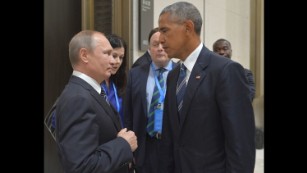His valedictory Asia tour, which moved on to Laos later in the day, is unfolding amid diplomatic slights and great power rivalries that reflect the unstable nature of the world Obama will bequeath to his successor in January.
The controversies reflect the way international politics is now a stew of many competing, rising or resurgent powers that see fewer reasons to simply fall into line behind the United States than was the case following World War II and the Cold War. And it may suggest that foreign leaders are now just as interested in who will sit in the Oval Office next as they are in Obama as he heads for the exit.
Obama is not only confronting regimes in Russia, China and North Korea that are at times openly hostile to Washington -- or at least willing to make clear they don't want to play by its rules -- but over the long weekend, he got headaches from allies as well, notably Turkey and the Philippines.
"Who is he?," the fiery new President of the Philippines, Rodrigo Duterte, asked Monday at a news conference, referring to Obama. The Southeast Asian leader warned he would lash out if the US President raised extrajudicial killings in the Philippines' new war on drugs in an anticipated meeting in Laos.
"I am a president of a sovereign state. And we have long ceased to be a colony of the United States," Duterte continued. "Son of a b****, I will swear at you."
It was a stunning show of disrespect for an American president. And though Obama shrugged off the comments from the "colorful" leader during his own news conference Monday, the White House later canceled his meeting with Duterte, conferring instead with the President of South Korea. Duterte later apologized for any offense caused.
Duterte is not the first erratic president of the Philippines, but his unpredictability and willingness to fan latent colonial resentment against the US represents an unwanted disruption for the White House at the end of Obama's tenure.
It comes in a regional cauldron where Beijing is making aggressive moves in the South China Sea and Southeast Asian nations are increasingly important to US efforts to rein in the rising power.
Obama had hoped to spend his final journey to Asia as president talking up the highlights of his pivot to the region. The fact sheet the White House put out at the conclusion of the G20 touted the economic progress under the eight years of the Obama presidency. And in one key outcome of the summit, he and Chinese President Xi Jinping formally agreed that both their nations would join the Paris Climate Agreement committing to cutting carbon emissions.
But that bright spot aside, his trip to China has offered reminders that since Obama took office in 2009 -- and especially since Xi emerged as a nationalist leader after taking office in 2012 -- Sino-US relations have worsened.
At the start of his trip, a logistical spat over missing airline airplane stairs needed for Obama to reach the red carpet at Hangzhou airport and verbal altercations between US and Chinese officials grabbed headlines.
At one point, a White House official warned a Chinese counterpart against restricting access of pool reporters under the wing of Air Force One, noting that it was, after all, a US plane. "This is our country," the man yelled back.
Obama shrugged off that incident, too, acknowledging that disagreements over press access often arise with China but contending that they were not emblematic of the US-China relationship.
The Republican hoping to succeed Obama, however, took a much dimmer view of the episode.
"Can you believe that the Chinese would not give Obama the proper stairway to get off his plane - fight on tarmac!" Donald Trump tweeted.

No comments:
Post a Comment